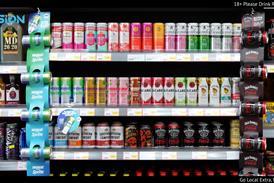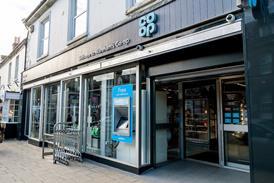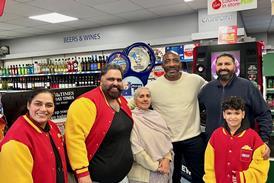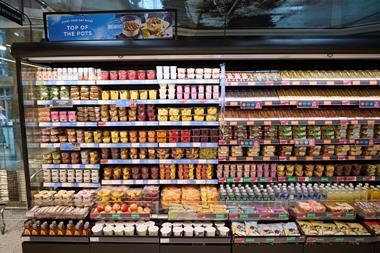A multiple planning to open on your doorstep might be your worst nightmare, yet some retailers have stood firm and survived to tell the tale. Here they reveal their winning tactics to Rich Airey
The big four have undoubtedly put the c-store sector under more pressure than ever over the past few years. There can't be many retailers who don't know what it feels like to experience the threat of one of the multiples moving into their patch. Yet pockets of pro-active retailers across the country haven't simply rolled over and have instead decided to tackle the supermarkets head-on.
Whether it's through organising a local campaign at the first whisper of a multiple's plans, or upping their game in readiness, some c-store retailers have won the battle if not the war.
Cardiff retailer Bhoo Patel fought a long and extremely difficult battle against Tesco, leading to the supermarket withdrawing plans to build an Express store on Bhoo's doorstep (C-Store, November 17, 2006).
Bhoo called his successful campaign against Tesco "a victory for common sense", but his campaign was far from easy, as he explained to Convenience Store: "In any given 24-hour period, I slept for no more than four to six hours. It was a process of hard-fought and argued dialogues, hours of talking on the phone and refusing to give up that won the day for me and my community."
Bhoo's campaign centred on massive support for his Premier store in the Whitchurch area of the city - a petition against Tesco's plans was signed by more than 5,000 people.
So what's Bhoo's advice? "It's vital other retailers who find themselves in a similar situation don't take a confrontational approach, as it will just make things worse." he said. "I went through the application with a fine-tooth comb. It also helped a great deal that I had the support of my local community. I think we made Tesco sit up and listen. Some 900 individual letters to Terry Leahy covering every single aspect of our complaint definitely helped our cause."
Another success story comes from Scottish-based Spar group Botterills, which two years ago was faced with the prospect of a Sainsbury's Local store opening on the doorstep of its 2,500sq ft store in Clarkston, on the outskirts of Glasgow.
Botterills took the view that it couldn't prevent the store from opening, but it could make sure it met some stiff competition when it did, so it widened its product offer and made fresh investment in the store. It proved too much for the competition and just one year after opening, the Sainsbury's Local closed.
Botterills operations manager Brian Straiton said: "Sainsbury's didn't get its offering right. We were able to put in some investment ahead of its arrival and that certainly paid off. I think it was taking about £25,000 a week when it opened, but we were getting £36,000. We focused on our offering, customer service and availability and that was half the battle won."
Brian added that while the company would always protest against any unfair supermarket applications, he had reservations over how much impact its opposition to them would have. "Unfortunately, it seems to be the case that the deal is often struck as soon as the application goes in," he explained. And while he applauded the efforts of campaigners across the UK, he added that retailers could do better by spending more time concentrating their efforts on improving the quality of their stores. "C-store retailers can't afford to stand still and not invest. You can't be afraid of these boys," he said.
Fellow Scottish retailer Jim Boggon has had to put up with the familiar sight of a Tesco Express fascia near his Edinburgh Londis store for the past two-and-a-half years. But despite the supermarket's presence in the Esso garage opposite, business is booming for Jim and his wife Shirley.
Jim agrees that investment is the key to remaining competitive when in such direct competition with a major multiple. "The Esso shop didn't really provide any real competition, but when we heard Tesco was moving in we knew we would have to act quickly. We revamped the store to the group's Genesis standard and we're really seeing the benefits. It wasn't an easy decision, but we decided to take them on. It is possible to compete with the Express stores because they don't actually offer the same deals as the supermarkets. We beat them on price every time."
Jim added: "It has helped that we've been here 14 years and are lucky to have quite a few loyal customers. Having services like the post office have also benefited us, as has being part of Londis."
Finding a point of difference is another clincher. Said Jim: "What's really been an advantage for us is our deli offering, where we offer made-to-order sandwiches. It's important to give customers something
different."
A couple of Spar retailers in the Welsh town of Carmarthen have also upset the odds. Again, the battle was with Tesco, which wanted to open a new Tesco Extra in the town centre. Local traders had struggled to fight the development, but Ralph and Anne-Louise Morgans refused to be intimidated and purchased a 650sq ft CTN store on the main high street.
"Everyone thought we were mad," said Anne-Louise. But determined they could make the business work, the couple took the plunge and agreed with their Spar business development manager from Capper & Co to invest £65,000 in a complete refit.
The projected turnover was £10,000 a week excluding utilities and the lottery. The opening week saw sales hit the target and just before the opening of the new Tesco they climbed to £15,000. Everyone braced themselves for a drop in trade, but quite the opposite happened. Turnover has since increased to £18,000 and Ralph and Anne-Louise believe there's room for further growth.
Ralph explained: "This was a huge gamble, but I felt sure there was a market for a Spar store that was convenient and with pleasant, helpful staff and run to a high standard."
Sometimes help comes from unexpected areas. At the end of December 2006, Tesco was forced to abandon plans to build a superstore in the Devon town of Torrington. Residents and businesses launched a campaign to block the development on a local playing field, claiming it would damage the vitality of the town centre.
Following the campaign, Torridge District Council's planning committee voted by 13-1 to give the green light to a rival proposal by Somerfield for a smaller development. Planning officers said that although Tesco had reduced its proposal's size from 4,406sq ft to 2,654sq ft, it was still felt the store would "adversely affect the vitality and viability of the town centre". Somerfield's 1,115sq ft store will have to be situated in a nearby former industrial yard.
Elsewhere, Northern Ireland retailer Eamonn Gee of Gee's supermarkets in Derry has a novel idea to either check Tesco's progress or at least turn it to the advantage of under-pressure town centres. He has suggested that councils force major supermarkets to recreate traditional town centre stores as a planning condition.
He explained: "We already have three Tescos, a Sainsbury's and M&S in Derry. Tesco wants to build another 100,000sq ft store and Asda also wants one of a similar size. Our town centre is dying, but you can't just say to people 'don't shop at Tesco' because they obviously want to.
"We should invite the supermarkets right into the town centre and break up their space into butchers, fruit & veg, record stores and so on. Then the supermarkets would have to either accept being split up into separate enterprises, or go elsewhere."
Eamonn has suggested this approach to a number of local councillors, and is trying to get independent retailers to join forces to better co-ordinate their opposition. He added: "You only need to look at America to see what damage big retail developments can do. We need to act before it's too late."
Avoid a confrontational approach - it will just make life more difficult
Up your offering
Invest in your store
Call on the support of the local community
Write to your local council and MP
Have a point of difference
Know your customers - c-stores will always have this advantage over the supermarkets
Be pro-active
The big four have undoubtedly put the c-store sector under more pressure than ever over the past few years. There can't be many retailers who don't know what it feels like to experience the threat of one of the multiples moving into their patch. Yet pockets of pro-active retailers across the country haven't simply rolled over and have instead decided to tackle the supermarkets head-on.
Whether it's through organising a local campaign at the first whisper of a multiple's plans, or upping their game in readiness, some c-store retailers have won the battle if not the war.
Cardiff retailer Bhoo Patel fought a long and extremely difficult battle against Tesco, leading to the supermarket withdrawing plans to build an Express store on Bhoo's doorstep (C-Store, November 17, 2006).
Bhoo called his successful campaign against Tesco "a victory for common sense", but his campaign was far from easy, as he explained to Convenience Store: "In any given 24-hour period, I slept for no more than four to six hours. It was a process of hard-fought and argued dialogues, hours of talking on the phone and refusing to give up that won the day for me and my community."
Bhoo's campaign centred on massive support for his Premier store in the Whitchurch area of the city - a petition against Tesco's plans was signed by more than 5,000 people.
So what's Bhoo's advice? "It's vital other retailers who find themselves in a similar situation don't take a confrontational approach, as it will just make things worse." he said. "I went through the application with a fine-tooth comb. It also helped a great deal that I had the support of my local community. I think we made Tesco sit up and listen. Some 900 individual letters to Terry Leahy covering every single aspect of our complaint definitely helped our cause."
Another success story comes from Scottish-based Spar group Botterills, which two years ago was faced with the prospect of a Sainsbury's Local store opening on the doorstep of its 2,500sq ft store in Clarkston, on the outskirts of Glasgow.
no pushover
Botterills took the view that it couldn't prevent the store from opening, but it could make sure it met some stiff competition when it did, so it widened its product offer and made fresh investment in the store. It proved too much for the competition and just one year after opening, the Sainsbury's Local closed.
Botterills operations manager Brian Straiton said: "Sainsbury's didn't get its offering right. We were able to put in some investment ahead of its arrival and that certainly paid off. I think it was taking about £25,000 a week when it opened, but we were getting £36,000. We focused on our offering, customer service and availability and that was half the battle won."
Brian added that while the company would always protest against any unfair supermarket applications, he had reservations over how much impact its opposition to them would have. "Unfortunately, it seems to be the case that the deal is often struck as soon as the application goes in," he explained. And while he applauded the efforts of campaigners across the UK, he added that retailers could do better by spending more time concentrating their efforts on improving the quality of their stores. "C-store retailers can't afford to stand still and not invest. You can't be afraid of these boys," he said.
Fellow Scottish retailer Jim Boggon has had to put up with the familiar sight of a Tesco Express fascia near his Edinburgh Londis store for the past two-and-a-half years. But despite the supermarket's presence in the Esso garage opposite, business is booming for Jim and his wife Shirley.
Jim agrees that investment is the key to remaining competitive when in such direct competition with a major multiple. "The Esso shop didn't really provide any real competition, but when we heard Tesco was moving in we knew we would have to act quickly. We revamped the store to the group's Genesis standard and we're really seeing the benefits. It wasn't an easy decision, but we decided to take them on. It is possible to compete with the Express stores because they don't actually offer the same deals as the supermarkets. We beat them on price every time."
Jim added: "It has helped that we've been here 14 years and are lucky to have quite a few loyal customers. Having services like the post office have also benefited us, as has being part of Londis."
extra special
Finding a point of difference is another clincher. Said Jim: "What's really been an advantage for us is our deli offering, where we offer made-to-order sandwiches. It's important to give customers something
different."
A couple of Spar retailers in the Welsh town of Carmarthen have also upset the odds. Again, the battle was with Tesco, which wanted to open a new Tesco Extra in the town centre. Local traders had struggled to fight the development, but Ralph and Anne-Louise Morgans refused to be intimidated and purchased a 650sq ft CTN store on the main high street.
"Everyone thought we were mad," said Anne-Louise. But determined they could make the business work, the couple took the plunge and agreed with their Spar business development manager from Capper & Co to invest £65,000 in a complete refit.
The projected turnover was £10,000 a week excluding utilities and the lottery. The opening week saw sales hit the target and just before the opening of the new Tesco they climbed to £15,000. Everyone braced themselves for a drop in trade, but quite the opposite happened. Turnover has since increased to £18,000 and Ralph and Anne-Louise believe there's room for further growth.
Ralph explained: "This was a huge gamble, but I felt sure there was a market for a Spar store that was convenient and with pleasant, helpful staff and run to a high standard."
Sometimes help comes from unexpected areas. At the end of December 2006, Tesco was forced to abandon plans to build a superstore in the Devon town of Torrington. Residents and businesses launched a campaign to block the development on a local playing field, claiming it would damage the vitality of the town centre.
council support
Following the campaign, Torridge District Council's planning committee voted by 13-1 to give the green light to a rival proposal by Somerfield for a smaller development. Planning officers said that although Tesco had reduced its proposal's size from 4,406sq ft to 2,654sq ft, it was still felt the store would "adversely affect the vitality and viability of the town centre". Somerfield's 1,115sq ft store will have to be situated in a nearby former industrial yard.
Elsewhere, Northern Ireland retailer Eamonn Gee of Gee's supermarkets in Derry has a novel idea to either check Tesco's progress or at least turn it to the advantage of under-pressure town centres. He has suggested that councils force major supermarkets to recreate traditional town centre stores as a planning condition.
He explained: "We already have three Tescos, a Sainsbury's and M&S in Derry. Tesco wants to build another 100,000sq ft store and Asda also wants one of a similar size. Our town centre is dying, but you can't just say to people 'don't shop at Tesco' because they obviously want to.
"We should invite the supermarkets right into the town centre and break up their space into butchers, fruit & veg, record stores and so on. Then the supermarkets would have to either accept being split up into separate enterprises, or go elsewhere."
Eamonn has suggested this approach to a number of local councillors, and is trying to get independent retailers to join forces to better co-ordinate their opposition. He added: "You only need to look at America to see what damage big retail developments can do. We need to act before it's too late."
The supermarket survival kit
Avoid a confrontational approach - it will just make life more difficult
Up your offering
Invest in your store
Call on the support of the local community
Write to your local council and MP
Have a point of difference
Know your customers - c-stores will always have this advantage over the supermarkets
Be pro-active



















No comments yet